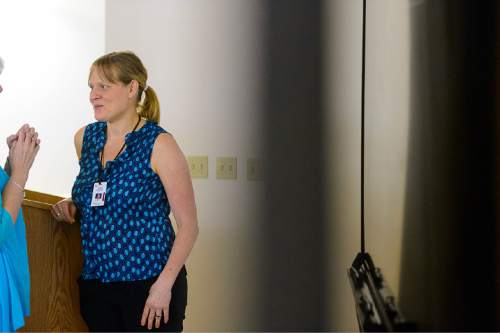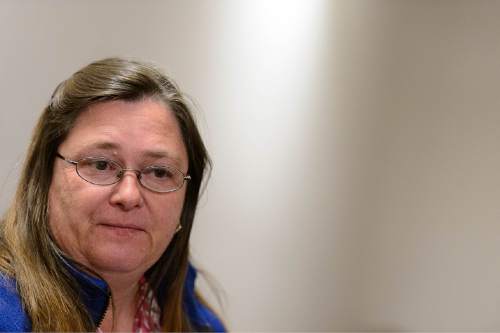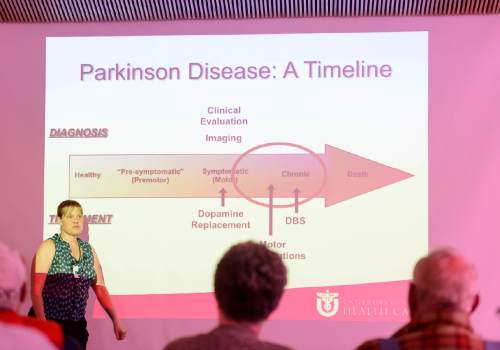This is an archived article that was published on sltrib.com in 2015, and information in the article may be outdated. It is provided only for personal research purposes and may not be reprinted.
Debbie Atwood was in her mid-40s when she was diagnosed with Parkinson's disease.
A longtime bank employee, she suddenly found she couldn't write with her right hand, nor could she run the 10-key adding machine she'd been using for two decades.
Soon, she began dragging her right leg.
Atwood, of Salt Lake City, has seen two neurologists but does not get the impression they know much about Parkinson's, a brain disorder that often starts with a tremor but can lead to muscle rigidity and difficulty walking, talking and doing simple tasks.
"They don't seem to listen to you, explain to you what to expect," says Atwood, now 52. "It's been very difficult."
So on Thursday, Atwood was at her first support group meeting for Parkinson's patients, hoping to finally connect with people who can help her understand the degenerative disease's progression and possible treatments.
She also learned that Utah has a new registry, as it does for cancer and autism, to track people like her, those with Parkinson's.
The Utah Parkinson Disease Registry, at UPDR.org, opened earlier this month. It's an online repository for reports now required of health care providers. Patients, too, can submit their own names and records to the website.
It's the first computerized registry in the nation. Nebraska is the only other state with a Parkinson's registry, but that state's is on paper, says Stefan Pulst, chairman of the neurology department at the University of Utah's School of Medicine.
The registry was Pulst's idea, and he worked for three years to get legislative approval and financial support from Utah philanthropic foundations. It's run jointly by the Utah Department of Health and the U. neurology department.
Though the registry's purpose is to help researchers get at the causes of Parkinson's, it inevitably will help educate Utahns — both physicians and patients — about the disease, Pulst says. He expects the registry to help patients learn more about research and clinical trials in which they can participate.
"We will really forge a community between physicians and patients," he says.
Nationally, 1 percent of the population over age 65 has the disease. But in Utah, it's closer to 2 percent, says Lauren Schrock, a University of Utah neurologist who specializes in Parkinson's and other movement disorders.
"We don't understand why that is," Schrock tells Atwood and a couple dozen other Parkinson's patients and their family members at the support group meeting.
"This is a question the registry might answer," says Pulst.
Researchers will link the registry records with those in the Utah Population Database to explore genetic and environmental causes of the disease, Pulst says. The records also can be matched against the cancer registry.
For decades, researchers have found both genetic and environmental causes of the disease, he says. "What has been very hard to analyze is how these two might interact."
Some genetic causes are triggered only under certain environmental conditions, so "it's difficult to untangle."
Knowing the numbers of Parkinson's patients in Utah's various counties — rural and urban — will be a boon for researchers.
Pulst expects that 700 to 1,000 new cases of Parkinson's will be reported each year in Utah.
Wes Starkenburg, 65, figures he benefits from research in which previous Parkinson's patients participated, so he'll put his information in the new database.
"It's important," says the retired civil engineer, who now is bent over from the waist as a result of Parkinson's. He was at Thursday's support group meeting jointly sponsored by the U. neurology department and the Utah chapter of the American Parkinson Disease Association.
Such meetings, he says, "are huge. They put us in touch with people."
Kim Smith, who teaches finance at Brigham Young University, says he has found good medical support and exercise are key. Schrock is his doctor at the U.
Smith, 61, retired from a long career with Goldman Sachs in New York City after learning he had Parkinson's about a decade ago. He had always been an avid athlete, playing basketball, racquetball, squash and tennis.
"I found it harder and harder to do those things."
For the first few years, he tried to hide the fact that he has Parkinson's. But now he tells his students up front what to expect: That he has horrible handwriting and poor balance. That sometimes his body will freeze and he'll almost tip over.
A registry, he says, is a great idea. He has a cousin and an uncle who have the disease, and figures there is a genetic cause.
"Problems like this, if you handle them correctly, they help you grow closer to the people who matter most to you."
Twitter: @KristenMoulton







